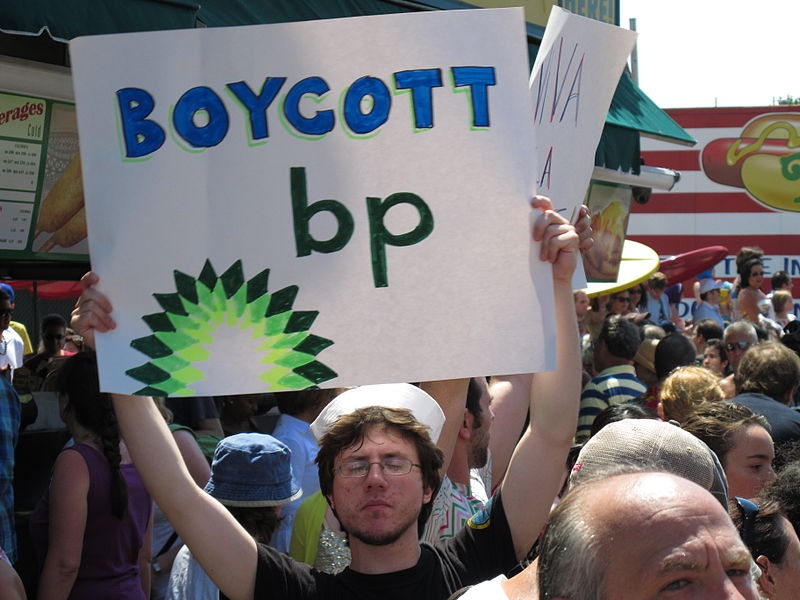The likely targets of a climate boycott

Writing in The Guardian this week about the urgency of stopping climate change, retired Anglican bishop and Nobel Peace Prize winner Desmond Tutu of South Africa called for a boycott of carbon polluters -- much like the international effort that helped end his country's white-supremacist apartheid regime.
"People of conscience need to break their ties with corporations financing the injustice of climate change," Tutu wrote:
We can, for instance, boycott events, sports teams and media programming sponsored by fossil-fuel energy companies. We can demand that the advertisements of energy companies carry health warnings. We can encourage more of our universities and municipalities and cultural institutions to cut their ties to the fossil-fuel industry. We can organise car-free days and build broader societal awareness. We can ask our religious communities to speak out.
We can actively encourage energy companies to spend more of their resources on the development of sustainable energy products, and we can reward those companies that do so by using their products. We can press our governments to invest in renewable energy and stop subsidising fossil fuels. Where possible, we can install our own solar panels and water heaters.
Which companies would be likely targets of an apartheid-style climate boycott?
Nearly two-thirds of all industrial carbon dioxide and methane released into the atmosphere since 1854 can be traced to fossil fuel and cement production by just 90 entities, according to the Union of Concerned Scientists. That includes 83 producers of coal, oil and natural gas and seven cement manufacturers.
The following are the top 10 "carbon majors" -- the leading emitters of carbon dioxide and methane emissions from 1854 to 2010, according to a study by the Climate Accountability Institute published last November. We note the location of their corporate headquarters, whether they are investor-owned or state-owned, and their cumulative emissions measured in millions of metric tons of carbon dioxide equivalent (MtCO2e):
1. Chevron, San Ramon, Calif. (investor-owned) -- 51,096 MtCO2e
2. ExxonMobil, Irving, Texas. (investor-owned) -- 46,672 MtCO2e
3. Saudi Aramco, Saudi Arabia (state-owned) -- 46,033 MtCO2e
4. BP, United Kingdom (investor-owned) -- 35,837 MtCO2e
5. Gazprom, Russian Federation (state-owned) -- 32,136 MtCO2e
6. Royal Dutch Shell, Netherlands (investor-owned) -- 30,751 MtCO2e
7. National Iranian Oil Company, Iran (state-owned) -- 29,084 MtCO2e
8. Pemex, Mexico (state-owned) -- 20,025 MtCO2e
9. ConocoPhillips, Houston (investor-owned) -- 16,966 MtCO2e
10. Petróleos de Venezuela (state-owned) -- 16,157 MtCO2e
Other U.S. companies on the list of the top 20 carbon emitters are Peabody Energy, the St. Louis-based coal giant (12,432 MtCO2e), and Consol Energy, a coal and natural gas production company headquartered in Pennsylvania (9,096 MtCO2e).
Looking at the biggest greenhouse gas polluters in the United States alone, we come up with a list dominated by electric utilities. The following are the "Greenhouse 10," according to a 2013 analysis by the Political Economy Research Institute, along with their location and 2011 emissions measured in metric tons of CO2 equivalent (tCO2e):
1. American Electric Power, Columbus, Ohio -- 130,409,118 tCO2e
2. Duke Energy, Charlotte, N.C. -- 126,750,270 tCO2e
3. Southern Co., Atlanta -- 118,092,746 tCO2e
4. U.S. Government -- 77,490,931 tCO2e
5. Berkshire Hathaway, Omaha, Neb. -- 70,790,868 tCO2e
6. Ameren Corp., St. Louis -- 67,800,250 tCO2e
7. Luminant Generation, Dallas -- 61,984,066 tCO2e
8. FirstEnergy, Akron, Ohio -- 53,247,501 tCO2e
9. AES Corp., Arlington, Va. -- 51,104,120 tCO2e
10. Xcel Energy, Minneapolis -- 50,829,838 tCO2e
Others in the top 20 of PERI's list include Dominion Resources of Richmond, Va. (44,072,686 tCO2e), NRG Energy of Houston (43,800,733 tCO2e), ExxonMobil of Irving, Texas (39,052,958 tCO2e), Calpine Corp. of Houston (38,100,700 tCO2e), LG&E/KU Energy of Louisville, Ky. (34,903,981 tCO2e), Entergy Corp. of New Orleans (34,534,104 tCO2e), and BP America of Houston (33,854,206 tCO2e).
Tutu is not the first to call for economic action against carbon polluters: Environmentalist writer Bill McKibben and his climate advocacy group 350.org called for a major stock-divestment campaign back in 2010. Tutu pointed to that campaign to show efforts to target carbon polluters are already underway. In fact, the same day Tutu's opinion piece ran in The Guardian, 93 members of Harvard University's faculty sent an open letter to the school's president calling on the school to divest its endowment -- the world's largest university endowment -- from the fossil fuel industry.
To date, at least 10 U.S. colleges and universities have committed to pursuing fossil fuel divestment, along with 21 U.S. cities and two counties. A number of religious institutions, foundations and other institutions are also pursuing fossil fuel divestment.
Tutu says an apartheid-style boycott would be a way to curb polluters' stranglehold over energy policy.
"We cannot necessarily bankrupt the fossil fuel industry," he wrote. "But we can take steps to reduce its political clout, and hold those who rake in the profits accountable for cleaning up the mess."
Tags
Sue Sturgis
Sue is the former editorial director of Facing South and the Institute for Southern Studies.
